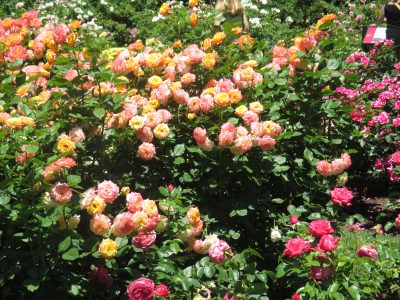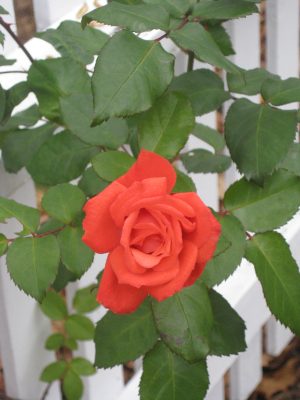By Dawn Pettinelli, UConn Home & Garden Education Center

The warmer days of spring will soon be upon us and it is time to think about spring rose care. Any winter protection such as mounded soil, mulch, leaves or rose cones that were placed around grafted bushes should be removed. Release any stems that were tied for winter protection. Fertilize your plants when new growth sprouts with a complete fertilizer such as 5-10-10 or and natural organic equivalent at the rate recommended by a soil test or follow the manufacturer’s instructions on the package. Generally, the fertilizer is sprinkled around the base of the plant and gently worked into the top of the soil.
Repeat blooming roses are heavy feeders and ideally should be fertilized monthly through July. Stop fertilizing at this time as later fertilizations may result in tender new growth late in the season that may not have time to harden off properly. Roses that bloom only once in June are usually only fertilized once in the spring. These include many ramblers and climbers, species roses and antique varieties. Rose books often recommend a dose of Epsom salts for each rose to supply magnesium. If you use a dolomitic limestone to modify the soil pH, however, the plants will most likely have enough magnesium available to them and additional magnesium will not improve growth or branching. Note that according to the American Rose Society, roses prefer slightly acidic soil so strive for a pH between 6.0 and 6.5..

Most types of roses benefit from a spring pruning with the exception of climbing roses which are generally pruned immediately following flowering. Roses are pruned to improve their appearance, to remove diseased or dead wood and to increase the quantity and quality of flowers.
Polyanthas, floribundas and shrub roses do not require much pruning. Any canes that are damaged or broken should be removed as well as canes that are rubbing together. If just the tip of the stem is winter killed, cut back to sound wood just above a healthy bud. Rose bushes that are really overgrown can have about one-third of their canes removed from the base.
Hybrid teas and grandifloras usually require more severe pruning. After eliminating all dead and damaged wood, cut back to 18 to 24 inches. Make your pruning cuts at a slant slightly above a bud, preferably one oriented away from the center of the plant.
If your roses are grafted, it is also important to remove any suckers arising from the rootstock.
Spring is a great time to add a few more roses to your garden. Roses are soil either bare-root or as container plants. Those sold in containers can be planted either in partial leaf or full leaf. Mail ordered bare-root stock, however, should be planted when it is still dormant. It is best to plant bare-root roses as soon as you get them. If planting has to be delayed for a day or two, remoisten the packing material and store in a cool, shady location. When it is time to plant bare-root stock, unpack the plant and place the roots in warm water for an hour or two. Cut off any dead or injured parts and plant immediately after soaking.
Roses require a minimum of 6 hours of sun each day for maximum bloom. An area with good air circulation will cut down on disease problems. Soil type is not as important as drainage. Roses will not tolerate wet feet.
When planting grafted plants, set the bud union, which is the point where a rose cultivar is grafted to the root stock, about one inch below the soil level. Roses require about one inch of water per week. If at all possible do not get the leaves wet when watering as this promotes the spread of diseases such as black spot.
Roses benefit from the application of an organic mulch like shredded bark, pine needles or cocoa bean hulls. Mulches not only keep weeds down but help conserve moisture. If you have any questions on roses or other gardening topics, contact the UConn Home & Garden Education at (877) 486-6271 or www.homegarden.cahnr,uconn.edu or your local Cooperative Extension Center.